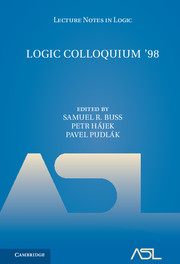Book contents
- Frontmatter
- Preface
- Opening speech of Petr Vopěnka
- Bolzano Medal awarded to Gaisi Takeuti
- Contents
- Collapsing Polynomial-Time Degrees
- Qualitative and Probabilistic Models of Full Belief
- Relative Splittings of in the-Enumeration Degrees
- A Realizability Interpretation for Classical Arithmetic
- An Axiomatization of Quantified Propositional Gödel Logic Using the Takeuti-Titani Rule
- Another Pathological Well-Ordering
- How Small Can the Set of Generics Be?
- Entailment Relations and Distributive Lattices
- The Friedberg Jump Inversion Theorem Revisited: A Study of Undefinable Cuts
- Hartley Rogers’ 1965 Agenda
- Liftings of Homomorphisms Between Quotient Structures and Ulam Stability
- Mathematical Fuzzy Logic – State of Art
- Reflections on the Last Delfino Problem
- Continuous Images of Coanalytic Sets
- Classification of Subsheaves over GL-Algebras
- On the Bit-Comprehension Rule
- Cardinal Invariants Associated with Predictors
- A Theorem on Countable Ordered Sets with an Application to Universal Graphs
- Dimension Theory and Smooth Stratification of Rigid Subanalytic Sets
- The Ramsey Structure of A-Determined Sets in a Saturated Universe
- On Definability of Admissible Sets
- Additive Theories
- Adding Multiplication to an O-minimal Expansion of the Additive Group of Real Numbers
- The Superjump in Martin-Löf Type Theory
- “Just Because”: Taking Belief Bases Seriously
- Artin Approximation via the Model Theory of Cohen-Macaulay Rings
- Ordinal Systems, Part 2: One Inaccessible
- Autonomous Fixed Point Progressions and Fixed Point Transfinite Recursion
- Finitary Reductions for Local Predicativity, I: Recursively Regular Ordinals
- The Complexity of Linear Logic with Weakening
- Some Remarks on the Maximality of Inner Models
- Author Index
- References
Collapsing Polynomial-Time Degrees
Published online by Cambridge University Press: 31 March 2017
- Frontmatter
- Preface
- Opening speech of Petr Vopěnka
- Bolzano Medal awarded to Gaisi Takeuti
- Contents
- Collapsing Polynomial-Time Degrees
- Qualitative and Probabilistic Models of Full Belief
- Relative Splittings of in the-Enumeration Degrees
- A Realizability Interpretation for Classical Arithmetic
- An Axiomatization of Quantified Propositional Gödel Logic Using the Takeuti-Titani Rule
- Another Pathological Well-Ordering
- How Small Can the Set of Generics Be?
- Entailment Relations and Distributive Lattices
- The Friedberg Jump Inversion Theorem Revisited: A Study of Undefinable Cuts
- Hartley Rogers’ 1965 Agenda
- Liftings of Homomorphisms Between Quotient Structures and Ulam Stability
- Mathematical Fuzzy Logic – State of Art
- Reflections on the Last Delfino Problem
- Continuous Images of Coanalytic Sets
- Classification of Subsheaves over GL-Algebras
- On the Bit-Comprehension Rule
- Cardinal Invariants Associated with Predictors
- A Theorem on Countable Ordered Sets with an Application to Universal Graphs
- Dimension Theory and Smooth Stratification of Rigid Subanalytic Sets
- The Ramsey Structure of A-Determined Sets in a Saturated Universe
- On Definability of Admissible Sets
- Additive Theories
- Adding Multiplication to an O-minimal Expansion of the Additive Group of Real Numbers
- The Superjump in Martin-Löf Type Theory
- “Just Because”: Taking Belief Bases Seriously
- Artin Approximation via the Model Theory of Cohen-Macaulay Rings
- Ordinal Systems, Part 2: One Inaccessible
- Autonomous Fixed Point Progressions and Fixed Point Transfinite Recursion
- Finitary Reductions for Local Predicativity, I: Recursively Regular Ordinals
- The Complexity of Linear Logic with Weakening
- Some Remarks on the Maximality of Inner Models
- Author Index
- References
- Type
- Chapter
- Information
- Logic Colloquium '98 , pp. 1 - 24Publisher: Cambridge University PressPrint publication year: 2000



